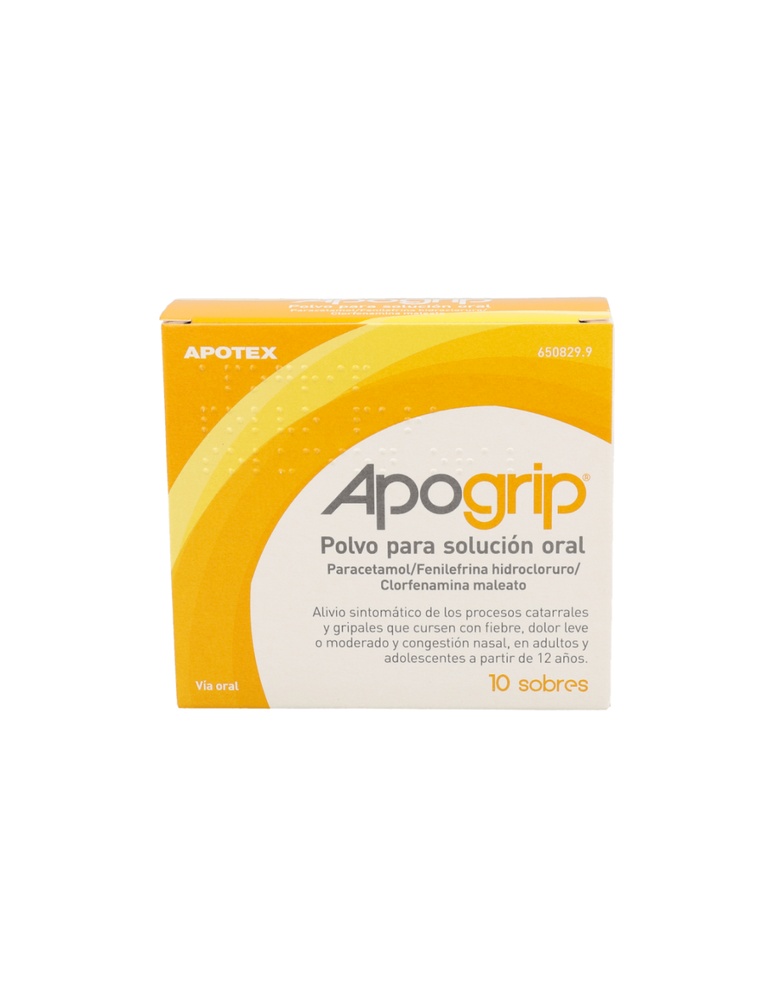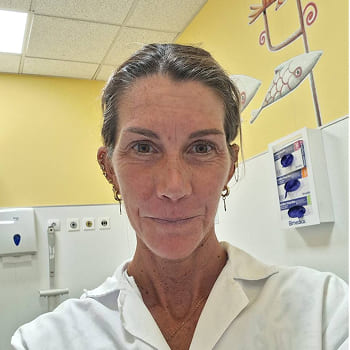
APOGRIP POWDER FOR ORAL SOLUTION


How to use APOGRIP POWDER FOR ORAL SOLUTION
Translated with AI
This page provides general information and does not replace a doctor’s consultation. Always consult a doctor before taking any medication. Seek urgent medical care if symptoms are severe.
Show originalContents of the leaflet
Introduction
Package Leaflet: Information for the User
Apogrip Powder for Oral Solution
Paracetamol / Phenylephrine Hydrochloride / Chlorphenamine Maleate
Read all of this leaflet carefully before you start taking this medicine, because it contains important information for you.
Follow the instructions for administration of the medicine contained in this leaflet or as indicated by your doctor or pharmacist.
- Keep this leaflet, as you may need to read it again.
- If you need advice or more information, consult your pharmacist.
- If you experience side effects, consult your doctor or pharmacist, even if they are side effects not listed in this leaflet.
- You should consult your doctor if your symptoms worsen or do not improve, or if the fever persists for more than 3 days or the pain for more than 5 days.
Contents of the Package Leaflet:
- What is Apogrip and what is it used for
- What you need to know before you start taking Apogrip
- How to take Apogrip
- Possible side effects
- Storage of Apogrip
- Contents of the pack and further information
1. What is Apogrip and what is it used for
It is an association of paracetamol, chlorphenamine, and phenylephrine.
Paracetamol is an analgesic that reduces pain and fever.
Chlorphenamine is an antihistamine that relieves nasal secretion.
Phenylephrine is a sympathomimetic that reduces nasal congestion.
It is indicated for the relief of symptoms of colds and flu that occur with fever or mild to moderate pain, congestion, and nasal secretion, in adults and adolescents from 12 years of age.
You should consult your doctor if your symptoms worsen or do not improve, or if the fever persists for more than 3 days or the pain for more than 5 days.
2. What you need to know before you start taking Apogrip
Do not take Apogrip
- if you are allergic to the active substances or to any of the other components of this medicine (listed in section 6),
- if you have high blood pressure,
- if you have hyperthyroidism,
- if you have diabetes mellitus,
- if you have tachycardia (rapid heartbeats),
- if you are being treated with a monoamine oxidase inhibitor (MAOI) (such as some antidepressants or medicines for Parkinson's disease),
- if you are being treated with sympathomimetic medicines (medicines used to treat asthma or to accelerate heart rate),
- if you are being treated with beta-blocker medicines (medicines for the heart or to treat artery diseases) (see: Taking Apogrip with other medicines),
- if you have glaucoma (increased eye pressure),
- if you have a serious heart or artery disease (such as coronary artery disease or angina pectoris),
- if you have a serious liver or kidney disease,
- children under 12 years of age cannot take this medicine.
Warnings and precautions
Consult your doctor or pharmacist before starting to take this medicine.
- Do not take more than the recommended dose of medicine in section 3: How to take Apogrip.
- Avoid taking this medicine simultaneously with other medicines that contain paracetamol, as high doses can lead to liver damage. Do not use more than one medicine that contains paracetamol without consulting your doctor.
- Chronic alcoholics should be cautious not to take more than 3 sachets of Apogrip per day.
- Patients with kidney, liver, heart, or lung disease, and patients with anemia.
- Asthmatic patients sensitive to acetylsalicylic acid.
- Patients sensitive (allergic) to an antihistamine, as they may be sensitive to other antihistamines (such as chlorphenamine).
- Patients being treated with medicines for: prostate hypertrophy, bronchial asthma, very slow heartbeats, hypotension, cerebral arteriosclerosis, pancreatitis, peptic ulcer, pyloroduodenal obstruction, thyroid diseases, patients sensitive to the sedative effects of some medicines.
- If you are being treated with tricyclic antidepressants or medicines with a similar effect and you experience gastrointestinal problems, you should stop taking this medicine and consult your doctor immediately, as you may develop paralytic ileus (stop of normal bowel movements).
- If you have serious diseases, such as severe renal failure or sepsis (when bacteria and their toxins circulate in the blood, causing organ damage), or if you have malnutrition, chronic alcoholism, or are also taking flucloxacillin (an antibiotic). A serious disease called metabolic acidosis (a blood and fluid anomaly) has been reported in patients in these situations when paracetamol is used at regular doses for a prolonged period or when paracetamol is taken with flucloxacillin. The symptoms of metabolic acidosis may include: severe breathing difficulties with deep and rapid breathing, drowsiness, feeling unwell (nausea) and vomiting.
- In case of glucose-6-phosphate dehydrogenase (G6PD) deficiency (can cause hemolytic anemia).
Children and adolescents
Children under 12 years of age cannot take this medicine.
Other medicines and Apogrip
Tell your doctor or pharmacist if you are taking, have recently taken, or might take any other medicines.
- In particular, if you are using any of the following medicines, as it may be necessary to modify the dose of some of them or interrupt treatment.
- Medicines for treating epilepsy (antiepileptics): lamotrigine, phenytoin, or other hydantoins, phenobarbital, methylphenobarbital, primidone, carbamazepine.
- Medicines for treating tuberculosis: isoniazid, rifampicin.
- Medicines for treating convulsions and depression (barbiturates), used as hypnotics, sedatives, and anticonvulsants.
- Medicines to prevent blood clots (oral anticoagulants): acenocoumarol, warfarin.
- Medicines used to increase urine production (diuretics, such as furosemide, or other diuretics), and other diuretics that cause potassium loss (such as diuretics for treating hypertension or other conditions).
- Medicines used to prevent nausea and vomiting: metoclopramide and domperidone.
- Medicines used to treat gout: probenecid and sulfinpyrazone.
- Medicines used to treat high blood pressure and heart rhythm disorders (arrhythmias): propranolol.
- Medicines to lower cholesterol levels in the blood: colestyramine.
- Medicines used to treat depression, Parkinson's disease, or other diseases (monoamine oxidase inhibitors (MAOIs)). Apogrip should be administered at least 15 days after finishing treatment.
- Medicines used to treat migraines; medicines taken for childbirth; medicines taken to treat blood pressure or other conditions (alpha-adrenergic blocking agents).
- Alpha and beta-adrenergic blocking agents, such as labetalol and carvedilol (used for the heart or to treat artery diseases).
- Medicines for treating depression (tricyclic and tetracyclic antidepressants).
- General anesthetic medicines.
- Antihypertensive medicines (medicines to lower blood pressure).
- Medicines for the heart, such as cardiac glycosides and antiarrhythmics.
- Medicines containing thyroid hormones (used to treat thyroid diseases).
- Medicines used for heart or digestive diseases (atropine sulfate).
- Medicines that depress the central nervous system (such as those used for insomnia or anxiety).
- Ototoxic medicines (which can damage the ear as a side effect).
- Photosensitizing medicines (which can cause light allergy as a side effect).
- Flucloxacillin (antibiotic), due to a serious risk of alteration of blood and fluids (called metabolic acidosis) that should be treated urgently (see section 2).
Interference with laboratory tests:
- If you are going to have any laboratory tests (including blood or urine tests, etc.), inform your doctor that you are taking this medicine, as it may alter the results.
Taking Apogrip powder with food, drinks, and alcohol
While being treated with this medicine, you should not consume alcoholic beverages, as it may enhance the appearance of side effects of this medicine.
Additionally, the use of medicines containing paracetamol by patients who habitually consume alcohol (3 or more alcoholic beverages: beer, wine, liquor... per day) may cause liver damage.
The medicine can be taken with or without food.
Pregnancy, breastfeeding, and fertility
If you are pregnant or breastfeeding, think you may be pregnant, or plan to become pregnant, consult your doctor or pharmacist before taking this medicine.
This medicine should not be taken during pregnancy unless your doctor considers it strictly necessary.
If necessary, Apogrip can be used during pregnancy. You should use the lowest possible dose that reduces pain or fever and use it for the shortest possible time. Contact your doctor or midwife if the pain or fever does not decrease or if you need to take the medicine more frequently.
This medicine should not be taken by breastfeeding mothers, as it may cause side effects in the baby.
Driving and using machines
This medicine may cause drowsiness. If you experience drowsiness during treatment with this medicine, avoid driving vehicles or using machines.
Apogrip sachets contain sucrose
Apogrip contains 3.994 g of sucrose in each sachet, which should be taken into account by patients with hereditary fructose intolerance, glucose/galactose malabsorption, sucrose-isomaltase deficiency, and diabetic patients.
3. How to take Apogrip
Follow these instructions for administration of the medicine contained in this leaflet or as indicated by your doctor or pharmacist. In case of doubts, ask your doctor or pharmacist.
The recommended dose is:
Adults and adolescents from 12 years of age: 1 sachet every 6-8 hours as needed (3 or 4 sachets per day). You should not take more than 3 grams of paracetamol per day (4 sachets) every 24 hours.
Patients with liver failure: these patients should not take more than 1 sachet every 8 hours. In no case should they take more than 3 sachets per day.
Patients with kidney failure: they should not take this medicine due to the paracetamol dose.
Use in children
This medicine is contraindicated in children under 12 years of age.
Use in the elderly
The elderly should not use this medicine without consulting their doctor, as some side effects of the medicine, such as slow heartbeats (bradycardia) or reduced cardiac output, may affect them especially due to the phenylephrine and chlorphenamine content. They are also more likely to experience side effects such as sedation, confusion, hypotension, or excitement and may be more sensitive to effects such as dry mouth and urinary retention.
How to take
Apogrip is taken orally.
Dissolve the contents of the sachet completely in a little liquid, preferably half a glass of water, and then drink.
Always take the lowest effective dose.
Treatment with this medicine is subject to the appearance of symptoms. As they disappear, you should stop treatment.
If the fever persists for more than 3 days of treatment, the pain or other symptoms for more than 5 days, or worsen, or new symptoms appear, you should consult your doctor.
If you take more Apogrip than you should
If you have ingested an overdose, you should go immediately to a medical center, even if you do not notice symptoms, as they often do not appear until 3 days after ingestion of the overdose, even in cases of severe poisoning.
The symptoms of overdose may be: dizziness, vomiting, loss of appetite, yellowing of the skin and eyes (jaundice), and abdominal pain. Anxiety, fear, agitation, headache (can be a symptom of high blood pressure), convulsions, insomnia (or intense drowsiness), clumsiness, feeling of fainting, instability, confusion, irritability, tremors, anorexia; psychosis with hallucinations (especially in children). Dry mouth, nose, or throat. Overdose can also cause: coagulation disorders (blood clots and bleeding).
Effects such as high blood pressure, arrhythmias (rapid or irregular heartbeats), palpitations, reduced urine production. Metabolic acidosis (decrease in blood alkalinity). With prolonged use, it can cause depletion of plasma volume (decrease in blood volume).
Treatment of an overdose is more effective if started within 4 hours after taking the overdose of the medicine.
Patients being treated with barbiturates or chronic alcoholics may be more susceptible to the toxicity of a paracetamol overdose.
In case of overdose or accidental ingestion, go immediately to a medical center or call the Toxicology Information Service (Telephone 91 562 04 20), indicating the medicine and the amount ingested.
Do not take a double dose to make up for forgotten doses.
4. Possible side effects
Like all medicines, Apogrip can cause side effects, although not everyone gets them.
During the period of use of paracetamol, phenylephrine, and chlorphenamine, the following side effects have been reported, whose frequency has not been established with precision:
- The side effects that may appear more frequently are:mild drowsiness, dizziness, muscle weakness: these side effects may disappear after 2-3 days of treatment. Difficulty in facial movements, clumsiness, tremors, alterations in sensations and tingling, dry mouth, loss of appetite, alterations in taste or smell, gastrointestinal disorders (which may decrease if the medicine is administered with food), nausea, vomiting, diarrhea, constipation, stomach pain, urinary retention, dry nose and throat, thickening of mucus, sweating, blurred vision or other vision disorders.
- The side effects that may appear with low frequency (rare) are:discomfort, low blood pressure (hypotension), and increased transaminase levels in the blood. Myocardial infarction, ventricular arrhythmia (irregular heartbeats), pulmonary edema (increased fluid volume in the lungs), and cerebral hemorrhage (at high doses or in sensitive patients).
Excitement (generally with high doses, and more frequent in elderly patients and children), which may include symptoms such as: restlessness, insomnia, nervousness, and even convulsions. Other side effects that may appear with low frequency are: chest tightness, lung noises, rapid or irregular heartbeats (generally with overdose), liver disorders (which may present with stomach pain or abdominal pain, dark urine, or other symptoms), allergic reaction, severe hypersensitivity reactions (cough, difficulty swallowing, rapid heartbeats, itching, swelling of eyelids or around the eyes, face, tongue, difficulty breathing, etc.), photosensitivity (sensitivity to sunlight), cross-sensitivity (allergy) with medicines related to chlorphenamine. Blood disorders (changes in blood cell formula, such as agranulocytosis, leucopenia, aplastic anemia, thrombocytopenia) with symptoms such as unusual bleeding, sore throat, or fatigue; low or high blood pressure, edema (swelling), ear disorders, impotence, menstrual disorders.
- The side effects that may appear with very low frequency (very rare) are:kidney diseases, cloudy urine, allergic dermatitis (skin rash), jaundice (yellowing of the skin), blood disorders (neutropenia, hemolytic anemia), and hypoglycemia (low blood sugar).
Paracetamol may damage the liver when taken in high doses or for prolonged treatments.
- Side effects with unknown frequency (cannot be estimated from available data):anxiety, irritability, weakness, high blood pressure (hypertension, generally with high doses and in sensitive patients), headache (can be a symptom of high blood pressure), very slow heartbeats (severe bradycardia), reduced peripheral blood vessel caliber (peripheral vasoconstriction), reduced cardiac output affecting especially the elderly and patients with poor cerebral or coronary circulation, possible production or worsening of heart disease, urinary retention, paleness, hair standing on end, high blood sugar (hyperglycemia), low potassium levels in the blood, metabolic acidosis (metabolic disorder), cold in the extremities (legs or arms), flushing, feeling of fainting (hypotension), a serious disease that can make the blood more acidic (called metabolic acidosis) in patients with severe disease using paracetamol (see section 2). With high doses, the following may occur: vomiting, palpitations, psychotic states with hallucinations; with prolonged use, a decrease in blood volume may occur.
If you experience side effects, consult your doctor or pharmacist, even if they are side effects not listed in this leaflet.
5. Storage of Apogrip
Keep this medicine out of the sight and reach of children.
Do not use Apogrip powder after the expiration date that appears on the packaging, after CAD. The expiration date is the last day of the month indicated.
No special storage conditions are required.
Medicines should not be disposed of via wastewater or household waste. Deposit the packaging and any unused medicines at the SIGRE point in your pharmacy. If in doubt, ask your pharmacist how to dispose of the packaging and any unused medicines. This will help protect the environment.
6. Package Contents and Additional Information
Composition of Apogrip sachets
- The active ingredients are 650 mg of paracetamol, 10 mg of phenylephrine hydrochloride (equivalent to 8.21 mg of phenylephrine) and 4 mg of chlorphenamine maleate (equivalent to 2.8 mg of chlorphenamine).
- The other components (excipients) are: anhydrous colloidal silica, anhydrous citric acid, sodium saccharin, sucrose, sodium cyclamate, and orange flavor.
Appearance of the product and package contents
Apogrip is a white, homogeneous powder, without lumps and with an orange flavor, presented in sachets packaged in cardboard boxes containing 10 sachets.
Marketing authorization holder and manufacturer
Aurovitas Spain S.A.U.
Avda. de Burgos, 16-D
28036 Madrid,
Spain
Manufacturer
Laboratorios Alcalá Farma, S.L.
Avenida de Madrid 82
28802 Alcalá de Henares (Madrid)
Date of the last revision of this prospectus:February 2025
Detailed and updated information on this medicine is available on the website of the Spanish Agency for Medicines and Health Products (AEMPS) http://www.aemps.gob.es/.
- Country of registration
- Prescription requiredNo
- Manufacturer
- This information is for reference only and does not constitute medical advice. Always consult a doctor before taking any medication. Oladoctor is not responsible for medical decisions based on this content.
- Alternatives to APOGRIP POWDER FOR ORAL SOLUTIONDosage form: ORAL SOLUTION/SUSPENSION, 7 mg/mlActive substance: Hederae helicis foliumManufacturer: Engelhard Arzneimittel Gmbh & Co. KgPrescription not requiredDosage form: EFFERVESCENT TABLET, 600 mgActive substance: acetylcysteineManufacturer: Kern Pharma S.L.Prescription not requiredDosage form: EFFERVESCENT TABLET, 600 mgActive substance: acetylcysteineManufacturer: Laboratorios Alter S.A.Prescription required
Online doctors for APOGRIP POWDER FOR ORAL SOLUTION
Discuss questions about APOGRIP POWDER FOR ORAL SOLUTION, including use, safety considerations and prescription review, subject to medical assessment and local regulations.
Frequently Asked Questions















